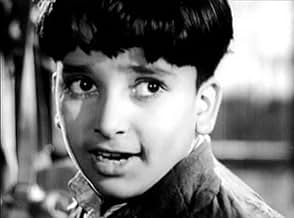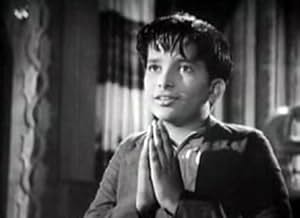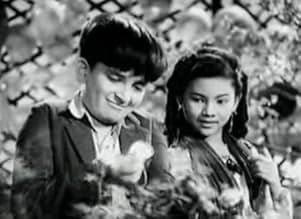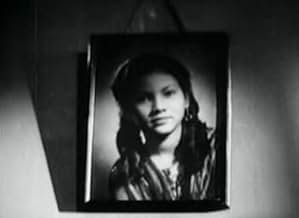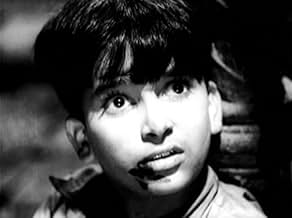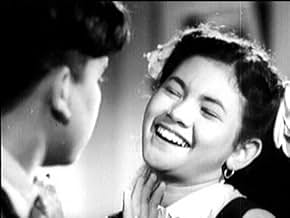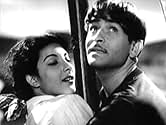Awaara
- 1951
- 3h 13min
VALUTAZIONE IMDb
7,8/10
4758
LA TUA VALUTAZIONE
Esplora il dibattito natura-contro-educazione. Il figlio di un bandito finirà sempre per essere un criminale?Esplora il dibattito natura-contro-educazione. Il figlio di un bandito finirà sempre per essere un criminale?Esplora il dibattito natura-contro-educazione. Il figlio di un bandito finirà sempre per essere un criminale?
- Premi
- 1 candidatura in totale
Prithviraj Kapoor
- Justice Raghunath
- (as Prithviraj)
Shashi Kapoor
- Young Raj
- (as Shashiraj)
Brij Mohan Vyas
- Dubey (Rita's Father)
- (as B.M. Vyas)
Leela Mishra
- Mr. Raghunath's Sister-In-Law
- (as Leela Misra)
Recensioni in evidenza
This movie is itself a legend. In 1988 TRT (Turkish national television) was to show that film. As I was a little child I could not now about the movies but that day my mother, grandmother, my uncles wife all got together and prepared delicious foods, and watched that movie on TV. Perhabs on that day all women in Turkiye were watching that film.
Mavi Boncuk, a delicious movie has reference to this film. On that movie Munir Ozkul says: - Aaah Awaara (at the time he looks to Awaara's poster) I've grown my children by selling it's tickets, played for 6 months on those days.
It is a fact that Awaara was a great success, on those days a film was playing for only a week but Awaara was in vision for 6 great months. I only remembered a scene from the film I watched when I was 6 years old, this is the scene that Raju stole a watch. Then 3 years ago I bought this film and watched with friends, my friends were very impressed with the movie, and we watched again and again.
Awaara is a milestone for Turkish cinema, it is filmed again by great Turkish actor Sadri Alisik in 1966. Arabesk is stated to enter Turkiye with Awaara. Adalet Cimcoz and Ferdi Tayfur spoke Nargis and Raj Kapoor in Awaara's Turkish dubbing version and film is great with that excellent dubbing.
Films song is also sung in Turkish lyrics by Sadri Alisik and song was also a hit.
Mavi Boncuk, a delicious movie has reference to this film. On that movie Munir Ozkul says: - Aaah Awaara (at the time he looks to Awaara's poster) I've grown my children by selling it's tickets, played for 6 months on those days.
It is a fact that Awaara was a great success, on those days a film was playing for only a week but Awaara was in vision for 6 great months. I only remembered a scene from the film I watched when I was 6 years old, this is the scene that Raju stole a watch. Then 3 years ago I bought this film and watched with friends, my friends were very impressed with the movie, and we watched again and again.
Awaara is a milestone for Turkish cinema, it is filmed again by great Turkish actor Sadri Alisik in 1966. Arabesk is stated to enter Turkiye with Awaara. Adalet Cimcoz and Ferdi Tayfur spoke Nargis and Raj Kapoor in Awaara's Turkish dubbing version and film is great with that excellent dubbing.
Films song is also sung in Turkish lyrics by Sadri Alisik and song was also a hit.
When I was little, my grandmother often told me about a movie from her younger ages - Awaara /released as Bradyaga/. She was always telling me, that when it came to Bulgaria it was a total hit. People watched it more that 20 times! (especially the gypsies, who thought of Indian people as their ancestors). If I ask somebody, who is over 50 year old about that film, I am sure, that he will remember it. And when the main actor - Raj Kapoor visited the country, thousands of people traveled to see him. My grandma, who was one of the best portrait photographers at that time and was asked to make his pictures with the leaders of the country, remembers that he and his wife never acted like international movie stars. They met with ordinary people, visited hospitals and orphanages. Why was that film so special? Especially in Bulgaria - a country on a Balcan peninsula with such a different culture from India? First of all, it was so different from the Soviet films that were broad-casted at that time. It was full of life, passion, love, music, and nevertheless - it was a social film - about the problems of the different classes. And it made a country so far away close. It was the first step for the good relationships between our two countries. A few years ago I have the chance to watch this movie. And I can tell, its messages are still up to day. Something that you can tell for every really good film. Watch it, you will not regret it.
I saw it as a kid, sometime in 1957 or 1958. I was marveled and for a long time the movie remained in my heart. I was humming the Awaara Hum all the time, I was imagining myself as Raj, I was thinking at Rita. I started to consider myself a grown up: after all also Raj started in the movie as a kid and became a grown up. I knew now his songs, I knew so all I needed to be a grown up.
Well, I was a kid; it seems that also grown ups were in love with Awara; someone told me of a respectable physician who had been seen hanging around and humming Awaara Hum.
And this was what was happening those times in Romania. And in Bulgaria. And in the Soviet Union. And in Turkey. Kids and grown ups were humming the songs, imagining themselves as Raj, unconditionally in love for Rita, kids considering themselves grown ups, grown ups behaving like kids.
The life of this movie was becoming a legend.
I watched again the movie, a couple of days ago, on TV. Of course it gave me an immense pleasure and I began (jokingly this time, while clearly happy) to sing Awaara Hum again.
Did I notice this time something that I had missed years ago? Well, this time I was able to examine the fascination conveyed by this movie, surrounding this movie. I was able to examine it, as I was now detached; long time ago I had been immersed in the fascinating universe of Awara.
I was able this time to observe that the fascination was not coming from the plot; it was from somewhere beyond. The actor playing the father of Raj was also in real life the father of Raj Kapoor. The same with the actor playing Raj as kid: he was the brother of Raj Kapoor. As for Nargis, the great actress playing Rita, she was in real life the great love of Raj Kapoor. And all the rest of the cast was infused with the chemistry among these guys: their reciprocal chemistry, their chemistry for the cinematic art.
I think at the secret of this movie: it has a secret, no doubt about. You see, in 1949 the Japanese Ozu had created Late Spring, followed by Early Summer in 1951, the same year Raj Kapoor created Awara; I consider Ozu one of the greatest masters of cinema; in 1956 the Indian Satyajit Ray would create Pather Panchali, which is maybe one of the most profound movies of all times; followed by Aparajito and then by The World of Apu. Well, Awara stands, courageously, in my preferences among the movies of these titans, and this because it has a secret of his own.
Many noted the Chaplinesque dimension of the tramp created by Raj Kapoor in Awara. And clearly Kapoor had Charlot in his mind: the same humorous courage to stand against all odds. But, it's not only Charlot in Awara; you feel there also the air of films noirs, while the romance, saturated with music, has a surrealist poetry.
And maybe here is where the secret lies: this movie was created with the pleasure for creating cinema; with the passion to succeed in bringing on the screen a perfectly popular movie. If you want to understand what Bollywood means, you should see this movie from 1951. A movie openly looking for popularity because made by someone in love for the people, someone loving to tell stories to enjoy the attendance. Awara has a clear social message, but, as someone has very well observed, it is not a popular movie made to convey the message, rather the opposite: the message serves to convey a popular movie.
Well, I was a kid; it seems that also grown ups were in love with Awara; someone told me of a respectable physician who had been seen hanging around and humming Awaara Hum.
And this was what was happening those times in Romania. And in Bulgaria. And in the Soviet Union. And in Turkey. Kids and grown ups were humming the songs, imagining themselves as Raj, unconditionally in love for Rita, kids considering themselves grown ups, grown ups behaving like kids.
The life of this movie was becoming a legend.
I watched again the movie, a couple of days ago, on TV. Of course it gave me an immense pleasure and I began (jokingly this time, while clearly happy) to sing Awaara Hum again.
Did I notice this time something that I had missed years ago? Well, this time I was able to examine the fascination conveyed by this movie, surrounding this movie. I was able to examine it, as I was now detached; long time ago I had been immersed in the fascinating universe of Awara.
I was able this time to observe that the fascination was not coming from the plot; it was from somewhere beyond. The actor playing the father of Raj was also in real life the father of Raj Kapoor. The same with the actor playing Raj as kid: he was the brother of Raj Kapoor. As for Nargis, the great actress playing Rita, she was in real life the great love of Raj Kapoor. And all the rest of the cast was infused with the chemistry among these guys: their reciprocal chemistry, their chemistry for the cinematic art.
I think at the secret of this movie: it has a secret, no doubt about. You see, in 1949 the Japanese Ozu had created Late Spring, followed by Early Summer in 1951, the same year Raj Kapoor created Awara; I consider Ozu one of the greatest masters of cinema; in 1956 the Indian Satyajit Ray would create Pather Panchali, which is maybe one of the most profound movies of all times; followed by Aparajito and then by The World of Apu. Well, Awara stands, courageously, in my preferences among the movies of these titans, and this because it has a secret of his own.
Many noted the Chaplinesque dimension of the tramp created by Raj Kapoor in Awara. And clearly Kapoor had Charlot in his mind: the same humorous courage to stand against all odds. But, it's not only Charlot in Awara; you feel there also the air of films noirs, while the romance, saturated with music, has a surrealist poetry.
And maybe here is where the secret lies: this movie was created with the pleasure for creating cinema; with the passion to succeed in bringing on the screen a perfectly popular movie. If you want to understand what Bollywood means, you should see this movie from 1951. A movie openly looking for popularity because made by someone in love for the people, someone loving to tell stories to enjoy the attendance. Awara has a clear social message, but, as someone has very well observed, it is not a popular movie made to convey the message, rather the opposite: the message serves to convey a popular movie.
in the East of Europe, under the Comunist regime, the Indian films have had a special status. as alternative to the Soviet movies and propaganda shows. but, in same measure, for the social message. clear . for romanticism and music and charm of actors and dramatic situations. but Awaara was more than a successful Indian film. it was, and remains, an epic. because it gives the right perspective about ordinary, every day situations. because it reminds the joy of life and the deep pain.because it is , like the childhood fairy tales, story of courage and self determination and love difficulties , sacrifice and happiness. because it is nice and bitter and translation in image of known situations. and, sure, for Raj Kapoor. in the East , the Indian film was an open window. Awaara was, for years, one of the most convincing examples.
Awaara is a stunning example of full tilt filmmaking. Featuring superb (and appropriate) musical interludes by the Shankar-Jaikashan team, this film effortlessly blends a wide range of influences: noir, gothic horror, neo-realism, and the surrealism of Jean Cocteau all come into play. Raj Kapoor and Nargis are one of the finest screen couples of all time, equaling if not topping Jean-Louis Barrault and Arletty in Children of Paradise, another possible cinematic influence on Kapoor, who also directed. This is an exciting, moving, and unforgettable film.
Lo sapevi?
- QuizIn Awaara, there are three genaration of the Kapoor family in the film. There is Deewan Kapoor in the film, who was the grandfather of Raj Kapoor (father of pritviraj ) who plays the role of judge, who comes in the beggining of the film and in the end, then Raj Kapoor's father, Pritviraaj and also his young brother, Shashi Kapoor (junior raj kapoor ) were also in this film. As a filmaker this was Raj Kapoor, his third film. This film got very famous in Russia. In a outdoor scene of Raj with Nargis, in the background, the music of the song ' na mangu sona chandi' could be heard there, 20 years later this tune was used in a song of. Bobby.
- ConnessioniFeatured in Century of Cinema: And the Show Goes On: Indian Chapter (1996)
- Colonne sonoreAwara Hoon
Sung by Mukesh
Music composed by Shankarsingh Raghuwanshi and Jaikishan Dayabhai Panchal (as Shankar-Jaikishan)
Lyrics by Shailendra
I più visti
Accedi per valutare e creare un elenco di titoli salvati per ottenere consigli personalizzati
- How long is Awaara?Powered by Alexa
Dettagli
- Tempo di esecuzione3 ore 13 minuti
- Colore
- Proporzioni
- 1.37 : 1
Contribuisci a questa pagina
Suggerisci una modifica o aggiungi i contenuti mancanti



